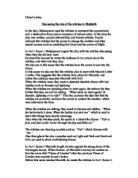Chris Cowley
Discussing the role of the witches in Macbeth
In the play, Shakespeare used the witches to represent the supernatural, evil, a destructive force and an inversion of natural order. At the time the play was written, people believed this, and feared witches. People believed that witches had the power to change the weather and other special powers such as predicting the future and the power of flight.
In Act 1 Scene 1 Shakespeare begins the play with the witches discussing when they should next meet.
He does this because he wants the audience to be curious about the witches, and what role they play.
We also see in this scene that the witches have the power to see into the future.
In this scene we also see that the witches plan to meet with Macbeth after a battle. This suggests that the witches have plans for Macbeth, and makes the audience associate Macbeth with Evil.
When the witches meet, they meet in deserted desolate places with bad weather such as thunder and lightning.
When the witches are deciding when to meet again, the enforce the idea further that they are evil by asking, "When shall we meet again? In thunder, lightning or in rain?" This also portrays the idea that that the witches are powerful, and have the power to control the weather which was believed at the time.
When the witches are talking, they speak in rhymes and riddles- "When the hurly-burly's done, When the battles lost and one" which is used to show that things have double meanings.
Discussing the role of the witches in Macbeth
In the play, Shakespeare used the witches to represent the supernatural, evil, a destructive force and an inversion of natural order. At the time the play was written, people believed this, and feared witches. People believed that witches had the power to change the weather and other special powers such as predicting the future and the power of flight.
In Act 1 Scene 1 Shakespeare begins the play with the witches discussing when they should next meet.
He does this because he wants the audience to be curious about the witches, and what role they play.
We also see in this scene that the witches have the power to see into the future.
In this scene we also see that the witches plan to meet with Macbeth after a battle. This suggests that the witches have plans for Macbeth, and makes the audience associate Macbeth with Evil.
When the witches meet, they meet in deserted desolate places with bad weather such as thunder and lightning.
When the witches are deciding when to meet again, the enforce the idea further that they are evil by asking, "When shall we meet again? In thunder, lightning or in rain?" This also portrays the idea that that the witches are powerful, and have the power to control the weather which was believed at the time.
When the witches are talking, they speak in rhymes and riddles- "When the hurly-burly's done, When the battles lost and one" which is used to show that things have double meanings.







